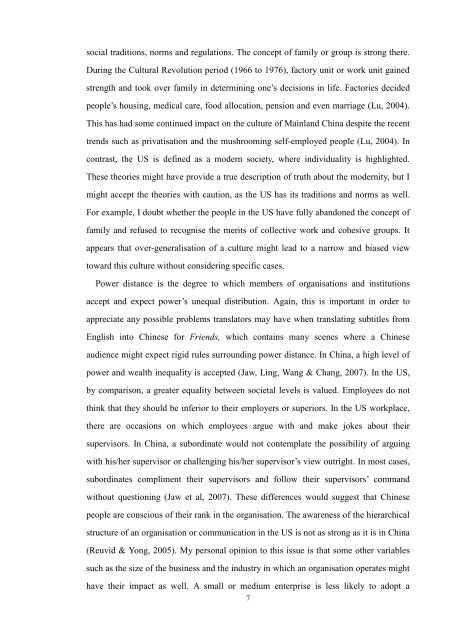View - Scholarly Commons Home
View - Scholarly Commons Home
View - Scholarly Commons Home
Create successful ePaper yourself
Turn your PDF publications into a flip-book with our unique Google optimized e-Paper software.
social traditions, norms and regulations. The concept of family or group is strong there.<br />
During the Cultural Revolution period (1966 to 1976), factory unit or work unit gained<br />
strength and took over family in determining one‟s decisions in life. Factories decided<br />
people‟s housing, medical care, food allocation, pension and even marriage (Lu, 2004).<br />
This has had some continued impact on the culture of Mainland China despite the recent<br />
trends such as privatisation and the mushrooming self-employed people (Lu, 2004). In<br />
contrast, the US is defined as a modern society, where individuality is highlighted.<br />
These theories might have provide a true description of truth about the modernity, but I<br />
might accept the theories with caution, as the US has its traditions and norms as well.<br />
For example, I doubt whether the people in the US have fully abandoned the concept of<br />
family and refused to recognise the merits of collective work and cohesive groups. It<br />
appears that over-generalisation of a culture might lead to a narrow and biased view<br />
toward this culture without considering specific cases.<br />
Power distance is the degree to which members of organisations and institutions<br />
accept and expect power‟s unequal distribution. Again, this is important in order to<br />
appreciate any possible problems translators may have when translating subtitles from<br />
English into Chinese for Friends, which contains many scenes where a Chinese<br />
audience might expect rigid rules surrounding power distance. In China, a high level of<br />
power and wealth inequality is accepted (Jaw, Ling, Wang & Chang, 2007). In the US,<br />
by comparison, a greater equality between societal levels is valued. Employees do not<br />
think that they should be inferior to their employers or superiors. In the US workplace,<br />
there are occasions on which employees argue with and make jokes about their<br />
supervisors. In China, a subordinate would not contemplate the possibility of arguing<br />
with his/her supervisor or challenging his/her supervisor‟s view outright. In most cases,<br />
subordinates compliment their supervisors and follow their supervisors‟ command<br />
without questioning (Jaw et al, 2007). These differences would suggest that Chinese<br />
people are conscious of their rank in the organisation. The awareness of the hierarchical<br />
structure of an organisation or communication in the US is not as strong as it is in China<br />
(Reuvid & Yong, 2005). My personal opinion to this issue is that some other variables<br />
such as the size of the business and the industry in which an organisation operates might<br />
have their impact as well. A small or medium enterprise is less likely to adopt a<br />
7

















